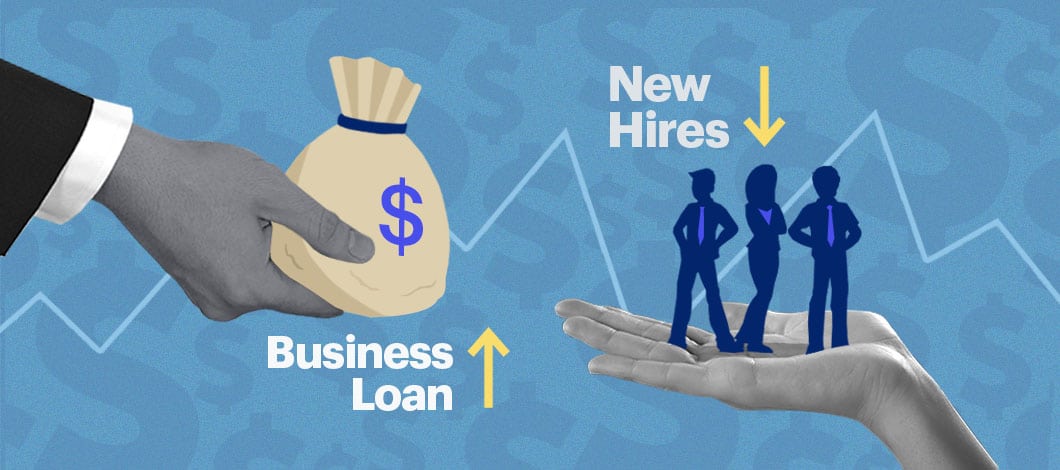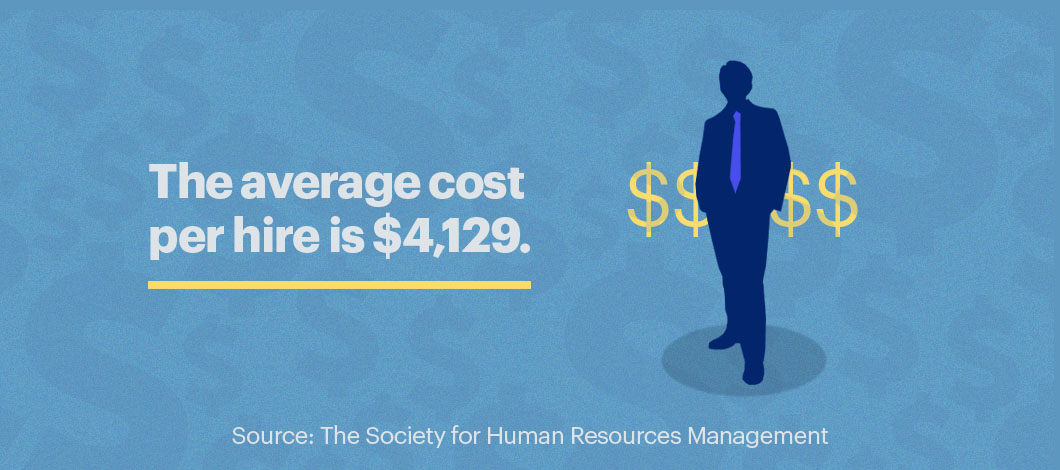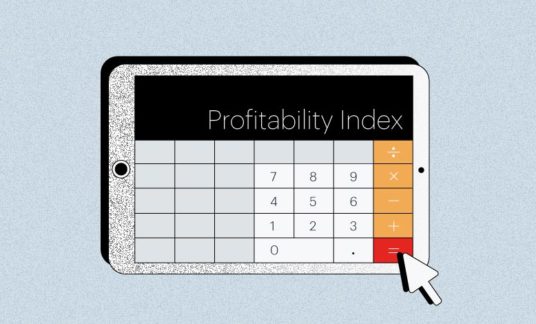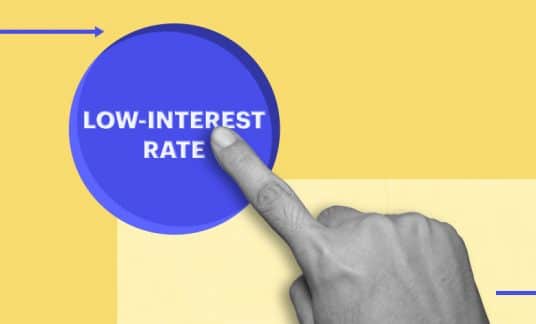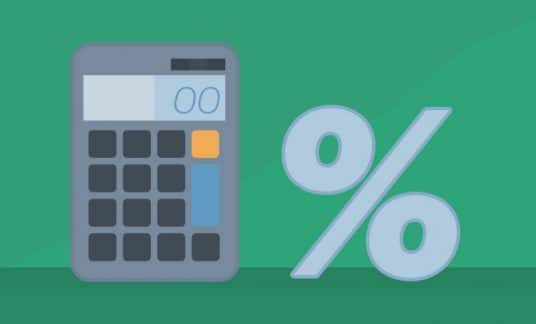It’s a dilemma a lot of small businesses face: They need to hire employees to staff the business or grow the business but either don’t have the cash on hand or don’t want to tie up capital right now. One possibility they might be weighing is using a small business loan to hire employees.
There are 31.7 million small businesses in the U.S., but not all of them are making money. About 40% of small businesses claim a profit. The rest are breaking even or are losing money. This makes it difficult for many to absorb the cost of hiring an employee without getting some additional cash influx.
If you’re thinking about taking out a small business loan to hire employees, we’ll take a look at the hiring cost, the pros and cons of taking out a small business loan, and the things you need to consider before taking the plunge.
How Much Does an Employee Cost?
When you’re trying to figure out how much does an employee cost, there are 5 things you need to consider:
- Wages
- Benefits
- Hiring and training
- Financial impact
Wages
The base wages are the easiest to figure. If you’re paying someone hourly, multiply the number of hours they’ll work based on the rate. If someone’s being paid $15 an hour and they’ll work full-time, multiple $15 x 2,080 and you’ll get a base wage of $31,200.
Benefits and Payroll Expenses
If you’re providing benefits, such as health care, you’ll also need to factor that into your employee cost calculation. According to the Bureau of Labor Statistics, health-care costs typically cost employers an average of 8% of total compensation while the total benefits package averages 31%.
If that seems high, it’s because there are also other payroll expenses that may include the employer share of the Federal Insurance Contribution Act (FICA, otherwise known as social security and medicare taxes), federal unemployment tax, state employment tax, workers’ comp, and other costs.
Hiring Costs and Training
There’s also the cost of hiring. While a position is open, you may be paying someone else overtime or working long hours yourself to compensate. There’s a cost either way. Attracting, recruiting, interviewing, and hiring also take time.
The Society for Human Resources Management (SHRM) estimates the average cost per hire is more than $4,100. Training can cost as much as $1,000 or more.
Financial Impact
Perhaps the biggest part of hiring an employee is to gauge the impact on your business. In other words, what’s the return on investment for hiring them? You need to evaluate the impact of hiring an employee as well as what happens if you don’t.
The Pros and Cons of a Small Business Loan to Hire Employees
As with any other financial decision you make about your business, there are pros and cons you need to consider. When you’re investing in one area, it may limit your ability to invest elsewhere.
Often, the decision to hire someone isn’t so much about whether the need exists, but it’s about where you can best spend capital to improve your business.
The Benefits of Taking Out a Loan for Hiring Employees
Taking out a loan for hiring employees can provide you with several benefits, including:
- Increase your bottom line
- Free up time for you to focus on growth
- Reduce the workload for your other employees
- Serve customers better
- Add new products, services, or ideas
The Disadvantage of Borrowing Money to Hire Employees
However, there are also some downsides you need to think about, including the potential for:
- Hiring the wrong person
- Negative impact on the team
- Overstaffing
- Overlooking other priorities
- Taking on additional debt
How to Get a Small Business Loan to Hire Employees
Getting a small business loan for hiring employees is fairly common, so it won’t come as a surprise when you approach a lender about doing so.
You should always shop around to make sure you’re getting the best possible rates, but most lenders are going to require certain things from you.
Besides completing a loan application, most lenders will want to know what you’re going to do with the money and why it’s a good investment. Financial institutions have a vested interest in your success so they can ensure they get paid, too. As such, they’ll want to see a business plan for how the money you’re borrowing will help generate the profits to repay the loan.
You also likely will be asked to provide:
- Government identification
- Business license (and any applicable permits)
- Articles of incorporation (if applicable)
- Personal and business tax returns
- Internal Revenue Service (IRS) tax forms
Lenders will take a look at all of this information and do their research, including checking your business credit score and payment history. When applying for a small business loan, most lenders also will want to take a look at your personal credit score as well.
Conventional lenders, such as banks or credit unions, will expect to see a minimum personal credit score of 670 for you to qualify. Alternative lenders may also offer financing for those with lower scores.
Before applying for a loan, you may want to check your credit scores. The better they are, the more likely you are to qualify for the best rates.
Financial institutions are also likely to evaluate:
- Debt-to-income (DTI) ratio
- Profit-and-loss statements
- Cash-flow statements
- Bank account balances
- Other outstanding debts
What documentation you will need depends on the lender, type and amount of the loan, and whether you have a stellar credit reputation or it needs some work.
SBA Loans
You may also want to look into getting an SBA loan. Loans backed by the Small Business Administration help make it easier for small businesses that may have challenges in qualifying for traditional bank loans.
There are several reasons this might be the case, such as only being in business for a short time, a lack of business credit history, marginal profits, or a poor credit score.
SBA loans are granted through authorized lenders and governed by SBA rules. Lenders are more likely to loan money to small businesses even if there’s some risk involved because the SBA guarantees parts of the loan in case of a default.
If you want to pursue an SBA loan, you’ll need to check the requirements to see if you qualify. You’ll likely need more documentation than when applying for a non-SBA loan.
So, Is a Small Business Loan to Hire Employees a Good Idea?
If you don’t have the cash right now to pay for employee hiring and funding, a small business loan can be a smart move if it helps grow or improve your business. However, you must always evaluate the return on investment. Taking out a loan means you will be taking on more debt and there’s always a price to pay for that.
Only you can determine whether applying for a small business loan to hire employees is right for your business.



